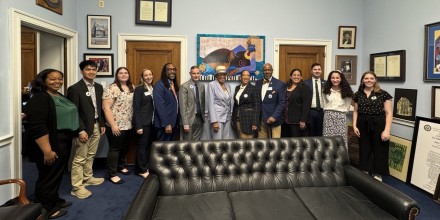CHARLOTTE, N.C., November 14, 2019 – November is recognized as National Marrow Awareness Month, which honors the people who donate stem cells and bone marrow to help give others a second chance at life. This year Dr. Antonia Mead, professor of Health Education, donated her stem cells to a blood cancer patient.
Mead was added to the Be the Match registry during the inaugural blood drive on campus in 2010. The drive has turned into an annual event in collaboration with Project Life Movement and the Central Intercollegiate Athletic Association (CIAA) to help break the stigma of bone marrow donation for minorities.
“Interesting enough, when I was doing the stem cell treatment, there was a white guy who came in before me and a white guy who came after me. So that’s the challenge they talk about,” Mead shared.
According to Be the Match, African American or Blacks have a 23 percent chance of finding a matched adult donor compared to 41 percent for people who identify as Asian and Pacific Islander, 46 percent for Hispanic or Latino people, and 77 percent for white people .
Mead shared that her experience did not come without criticism. Family members, in fear that the procedure could cause her health problems would say, “Don’t be doing nothing that’s going to injure you.”
While Mead had been listed on the registry for years, it was her mother that inspired her to go through with the procedure after receiving the the call that she was a match. Meads mother was diagnosed with gynelogical cancer in 2013, and died three years later after undergoing chemotherapy and radiation treatment.
“I know what it’s like to have more time with your family member battling cancer,” Mead said. “There was nothing like that to help my mom.”
Mead, who expressed her gratitude for the additional time with her mom after diagnosis added, “I don’t know what this lady has been through. She could be somebody’s mama, she could be somebody’s sister. She’s definitely somebody’s child, she could be somebody’s aunty, she’s somebody’s friend; I can give her more time possibly.”
The process of donating was easy for Mead, especially during the pre-transplant process, but she noted that there was times during the procedure the process became difficult.
“The procedure took three hours. That last hour, that’s when it got hard because you’re lying there with two needles in your arms and you can’t move,” Mead said.
Donors who are a match may also face obstacles that could prevent them from doing the transplant.
“Depending on the age of the donor it can be complicated. You may not be able to take off from work; there could be some challenges that block you from giving.”
As part of the requirements of the process, Mead has had no contact with the cancer patient. A year from now the patient has the option to contact Mead and speak with her if she chooses. While she is happy she helped, Mead feels like she has done her part, and is fine with whatever decision the patient decides.
JCSU Student Athlete Advisor Committee will host their annual blood drive in April during Minority Health Month. Mead hopes stories like hers encourages others to donate blood and help give people in need a second chance at life.



